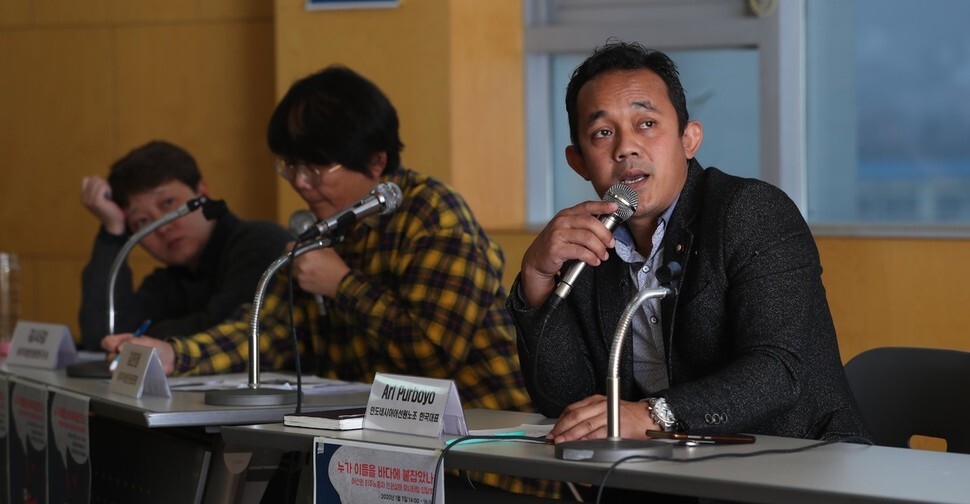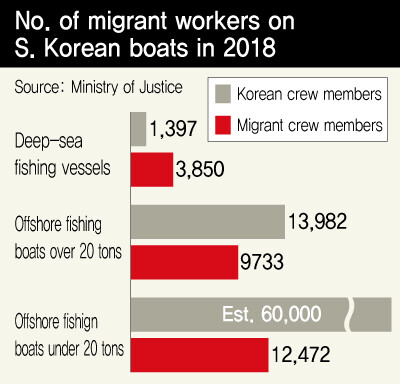hankyoreh
Links to other country sites 다른 나라 사이트 링크
Migrant workers aboard S. Korean fishing boats regularly abused and exploited

Xu Ly Tho (pseudonym), a migrant fishing boat worker from Vietnam, was assaulted with a shovel by South Korean crew members on a boat. At the time, he was attempting to take a brief rest while busily taking down a net in the darkness of early morning after a brief three-hour sleep on a wooden plank.
“I was very hungry, so I ate something, and they hit me on the back with a shovel while preventing me from eating,” he said.
Migrant workers who have come to South Korea to work in the fishing industry are being subjected to physical and verbal assault and wage exploitation. At the Girl Scouts Building in Seoul’s Jung (Central) District on Jan. 7, the Human Rights Networks for Fishing Boat Migrant Workers announced findings from a survey of 81 migrant workers on South Korean fishing boats.
According to the findings, migrant crew members were chiefly being subjected to verbal abuse, including terms such as “saekkiya” (“son of a bitch”) and “ssibal nom” (“fucking asshole”). Two out of three were working extremely long periods of up to 16 hours a day, while 92% reported being unable to take a single day off. Vietnamese worker “A,” who worked on a squid-fishing boat in Busan, reported, “They curse at you if you eat a lot, and they curse at you if you don’t eat much. They curse at you if you eat quickly, and they curse at you if you eat slowly.” Another Indonesian worker “B,” who worked on a beltfish boat in South Gyeongsang, said, “The curses just go in one ear and out the other. If you kept them in your mind, they would fill several rooms.”
Wage discrimination and deceptive practices qualify as human trafficking
Wage exploitation remained a serious problem, despite the issue receiving major attention in the wake of an international scandal when migrant crew members on the South Korean vessel Oyang 75 left en masse in 2012 after being unable to tolerate the physical abuse and wage exploitation there. Forty-three out of the 63 workers who agreed to answer wage-related questions said they were receiving less than the minimum wage.
“The South Korean crew members in their 60s and 70s didn’t do much work and gave everything to us to do, and they received 3.5 million won (US$2,988) a month,” A reported. “Even the Korean head cook earned over 3 million won (US$2,561) a month just for cooking, whereas I received 300,000 won (US$256) working as head cook.”
Illegal brokers consistently overcharge workers for job placement
Another persistent problem concerned the illegal practice of brokers charging exorbitant “job placement fees.” The survey found that migrant crew members from Indonesia and Vietnam had respectively paid an average of 5 million won (US$4,270) and 10 million won (US$8,541) in dispatching fees. In some cases, crew members’ land documents and diplomas were held as security when they went to work on the boats. Some workers also paid “flight deposits” – a sum of money paid in advance to ensure against workers fleeing the boats. The study found that Indonesian and Vietnamese crew members had respectively paid an average of 2 million won (US$1,708) and 4.8 million won (US$4,099) for flight deposits.
Forced to rely on barges and uninhabited islands in the sea for their accommodations, some workers faced conditions tantamount to imprisonment. Catholic Sister Marie Solina, who surveyed housing conditions for migrant fishing boat workers in Jeolla Province, reported, “They would provide workers with conditions without insulation or heating, completely isolated from any kind of social infrastructure, and then tell them, ‘It’s probably better than a hotel in your country.’”
Jeong Sin-yeong, an attorney with Advocates for Public Interest Law (APIL), explained, “Internationally, human trafficking refers to the act of recruiting or transporting people for purposes of labor exploitation through the use of fraud or deception or exploitation of vulnerable status. [The housing conditions identified in the study] could be seen as amounting to lawful human trafficking.”
“We need to reinforce the public sector’s role in the migrant fishing boat worker recruitment and job placement processes and eliminate wage and accident compensation discrimination based on nationality,” Jeong said.
“We also need to amend the law to prohibit conditions that amount to imprisonment,” she added.
By Lee Wan, staff reporter
Please direct comments or questions to [english@hani.co.kr]

Editorial・opinion
![[Editorial] Penalties for airing allegations against Korea’s first lady endanger free press [Editorial] Penalties for airing allegations against Korea’s first lady endanger free press](https://flexible.img.hani.co.kr/flexible/normal/500/300/imgdb/original/2024/0502/1817146398095106.jpg) [Editorial] Penalties for airing allegations against Korea’s first lady endanger free press
[Editorial] Penalties for airing allegations against Korea’s first lady endanger free press![[Editorial] Yoon must halt procurement of SM-3 interceptor missiles [Editorial] Yoon must halt procurement of SM-3 interceptor missiles](https://flexible.img.hani.co.kr/flexible/normal/500/300/imgdb/child/2024/0501/17145495551605_1717145495195344.jpg) [Editorial] Yoon must halt procurement of SM-3 interceptor missiles
[Editorial] Yoon must halt procurement of SM-3 interceptor missiles- [Guest essay] Maybe Korea’s rapid population decline is an opportunity, not a crisis
- [Column] Can Yoon steer diplomacy with Russia, China back on track?
- [Column] Season 2 of special prosecutor probe may be coming to Korea soon
- [Column] Park Geun-hye déjà vu in Yoon Suk-yeol
- [Editorial] New weight of N. Korea’s nuclear threats makes dialogue all the more urgent
- [Guest essay] The real reason Korea’s new right wants to dub Rhee a founding father
- [Column] ‘Choson’: Is it time we start referring to N. Korea in its own terms?
- [Editorial] Japan’s rewriting of history with Korea has gone too far
Most viewed articles
- 160% of young Koreans see no need to have kids after marriage
- 2Months and months of overdue wages are pushing migrant workers in Korea into debt
- 3[Editorial] Penalties for airing allegations against Korea’s first lady endanger free press
- 4Presidential office warns of veto in response to opposition passing special counsel probe act
- 5Hybe-Ador dispute shines light on pervasive issues behind K-pop’s tidy facade
- 6S. Korea “monitoring developments” after report of secret Chinese police station in Seoul
- 7[Reporter’s notebook] In Min’s world, she’s the artist — and NewJeans is her art
- 8[Exclusive] Hanshin University deported 22 Uzbeks in manner that felt like abduction, students say
- 9All eyes on Xiaomi after it pulls off EV that Apple couldn’t
- 10OECD upgrades Korea’s growth forecast from 2.2% to 2.6%